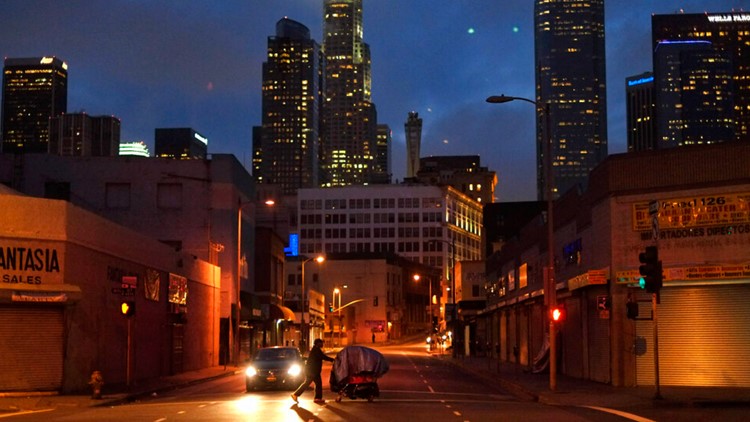

Bills launched in a number of states differ in their approaches to mountain climbing taxes, however all revolve round the concept that the richest Americans must pay extra.
NEW YORK — Supporters of taxes on the very wealthy contend that individuals are rising from the COVID-19 pandemic with an even bigger urge for food for what they’re calling “tax justice.”
Bills introduced Thursday in California, New York, Illinois, Hawaii, Maryland, Minnesota, Washington and Connecticut differ in their approaches to mountain climbing taxes, however all revolve round the concept that the richest Americans must pay extra.
All of the proposals face questionable prospects. Similar laws has died in state legislatures and Congress. But the brand new push reveals that the political left isn’t prepared to surrender on the populist argument that authorities can and ought to be used as a device for redistributing wealth.
“Under the pandemic, while people struggled to put food on the table, we saw billionaires double their wealth,” stated California Assembly Member Alex Lee, a Democrat.
The Tax Foundation, a conservative-leaning coverage group, known as wealth taxes — which levy taxes not simply on new revenue, however on an individual’s complete property — “economically destructive.”
It additionally stated in an announcement that such taxes create “perverse incentives” for the wealthy to keep away from taxes, together with merely shifting to states with a decrease tax burden.
“Very few taxpayers would remit wealth taxes — but many more would pay the price,” the group stated in an announcement. Progressive Democrats, nonetheless, argue they aren’t seeing wealthy taxpayers leaving their states on account of larger taxes.
California already taxes the wealthy greater than most states. The prime 1% of earners account for about half of the state’s revenue tax collections. But this week, Lee proposed a “wealth tax,” just like one promoted for years by U.S. Sen. Elizabeth Warren, a Massachusetts Democrat.
It would impose an annual tax of 1.5% on property of greater than $1 billion and 1% on property of $50 million or extra. The new tax on wealth, not annual revenue, would have an effect on an estimated 23,000 “ultra-millionaire” and 160 billionaire households, or the highest 0.1% of California households, Lee stated.
In Connecticut, progressive lawmakers are proposing extra conventional hikes: a better tax price on capital features earnings for wealthy taxpayers and better private revenue tax charges for millionaires.
“We need to ensure that the wealthiest in our state truly pay what they owe and not expect working families across our state to continue to subsidize their share,” stated state Rep. Kate Farrar, a deputy majority chief in the Democrat-controlled House of Representatives.
One impediment to such proposals is that some states the place the concept is perhaps common are at the moment operating price range surpluses, that means there may be little stress to lift income.
Connecticut is anticipated to finish its fiscal yr with a $3 billion surplus. Hawaii is projecting a price range surplus of $1.9 billion going into the brand new legislative session.
But Hawaii state Rep. Jeanne Kapela, a Democrat, stated a proposal there to increase the state’s capital features tax is extra about financial fairness than elevating cash.
“If you look at our tax code now, it’s really the definition of economic inequality,” Kapela stated.
The lowest-paid staff in many states typically see a far greater share of their revenue go to pay taxes yearly than the very wealthy, significantly in states that don’t have a graduated revenue tax.
Voters in Massachusetts, which had a flat revenue tax, approved an amendment to the state constitution in November that units a better price for these incomes greater than $1 million a yr.
Despite optimism expressed by liberal lawmakers that 2023 might be the yr, many of those proposals face an uphill battle, even in blue states with Democratic governors.
“This ‘tax the rich’ has been round earlier than and it’s current once more. And fairly frankly, it by no means obtained traction earlier than and I severely doubt there’s an urge for food for it now,” stated Gary Rose, professor of political science at Sacred Heart University in Fairfield, Connecticut.
Lots of people, he stated, do not resent the wealthy as a lot as some progressive Democrats.
“I think if you polled the American people, a lot of people want to get rich themselves and it’s part of, if you will, the American Dream,” Rose stated. “We’ve by no means actually had in this nation an amazing urge for food for taxing the wealthy as a result of getting wealthy … is actually a part of who we’re and what separates this nation from many Democratic socialist nations.”
A wealth tax invoice in California by no means even obtained a public listening to final yr. Gov. Gavin Newsom, a Democrat who was simply elected to a second time period in a landslide, has actively campaigned in opposition to efforts to increase taxes on the wealthy.
His opposition helped sink a 2022 poll initiative that might have raised taxes on the wealthy to pay for electrical automobile charging stations and wildfire prevention.
In Connecticut, Democratic Gov. Ned Lamont, a multimillionaire, says he needs to focus his second time period on lowering taxes somewhat than elevating them.
Associated Press Writer Audrey McAvoy in Honolulu, Hawaii and Adam Beam in Sacramento, Calif. contributed to this report.
story by Source link


